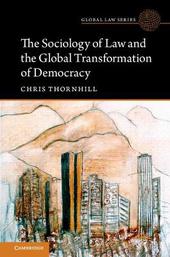
|
The Sociology of Law and the Global Transformation of Democracy
Paperback / softback
Main Details
| Title |
The Sociology of Law and the Global Transformation of Democracy
|
| Authors and Contributors |
By (author) Chris Thornhill
|
| Series | Global Law Series |
|---|
| Physical Properties |
| Format:Paperback / softback | | Pages:596 | | Dimensions(mm): Height 228,Width 150 |
|
| ISBN/Barcode |
9781316649060
|
| Classifications | Dewey:340.115 |
|---|
| Audience | | Professional & Vocational | |
|---|
| Illustrations |
Worked examples or Exercises
|
|
Publishing Details |
| Publisher |
Cambridge University Press
|
| Imprint |
Cambridge University Press
|
| Publication Date |
21 June 2018 |
| Publication Country |
United Kingdom
|
Description
This book provides a new legal-sociological account of contemporary democracy. It is based on a revision of standard positions in democratic theory, reflecting the impact of global legal norms on the institutions of national states. Chris Thornhill argues that the establishment of fully democratic, fully inclusive governance systems in national societies was generally impeded by inner-societal structural factors, and that inclusive patterns of democratic citizenship only evolved on the foundation of global legal norms that were consolidated after 1945. He claims that this process can be best understood through a transposition of key insights of classical legal sociology onto the form of global society. Extensive analysis of select case studies in different regions illustrate these claims. Thornhill offers a sociological theory of global law to explain contemporary processes of democratic integration and institutional formation, and contemporary constructions of citizenship and political rights. This title is also available as Open Access.
Author Biography
Chris Thornhill is Professor in Law at the University of Manchester. He is the author of several books on the sociology of law, especially on the sociology of constitutions. His books and other writings have been translated into many languages. He is a member of the Academia Europaea.
Reviews'Chris Thornhill endeavours to reconstruct a theory of democracy that is descriptively more realistic and normatively more robust than classical theories of democracy. ... This work has the merit that it connects a very informed socio-historical approach with a fundamental sociological thesis concerning the linkage between the political system and the system of law. ... [A] book that is without any doubt of crucial importance in the contemporary sociology of law.' Jean de Munck, translated from Droit et Societe 'Here, [Thornhill] reexamines modern democracy's historical transformation from its revolutionary beginnings in the late 18th century to its consolidation after 1945. Thornhill rejects the metaphysical concepts of classical democratic theory that centered on the political will of the citizen as the basis for democratic organization. Taking instead a legal-sociological perspective, he argues that the rise of global democracy after 1945 resulted from the emergence of international human rights law ... Highly recommended.' A. Javier Trevino, Choice
|